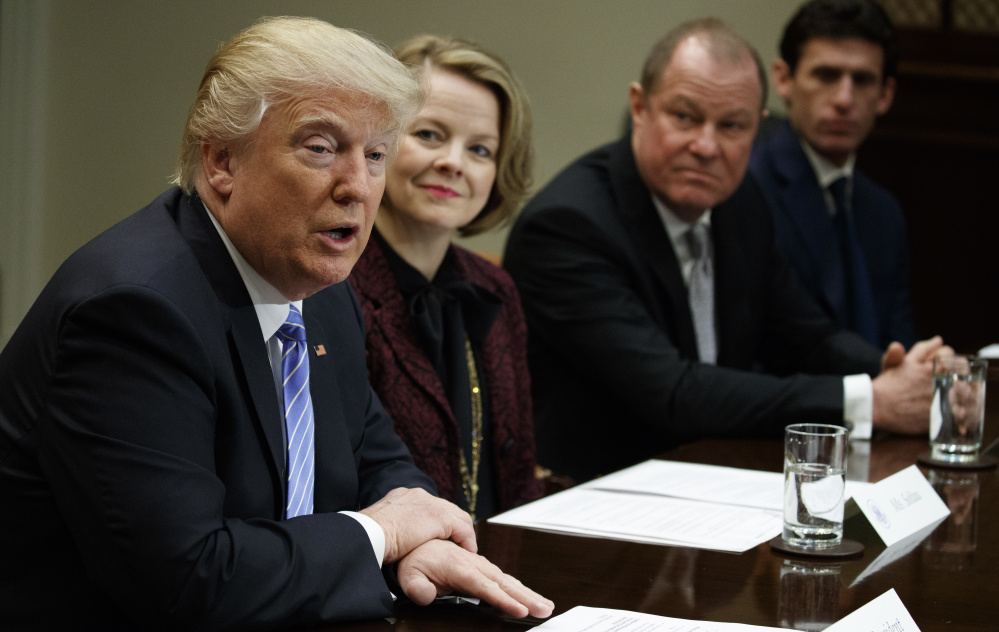WASHINGTON — President Trump met Wednesday with a group of executives from big-name retailers such as Target and Best Buy, as the industry leaders made the case that they believe a Republican plan for tax reform would be detrimental to their businesses – and to the wider economy.
Major retailers have come out swinging against a provision of the tax proposal known as border adjustment, which effectively creates a new tax on imports. Given that goods such as apparel and electronics are largely made overseas, the stores fear their tax bills will soar so high that they will be forced to hike the prices that shoppers see on store shelves.
“We stressed the importance of taking a thoughtful approach to tax reform for both individuals and corporations,” Bill Rhodes, chief executive of AutoZone and chairman of the Retail Industry Leaders Association, said in a statement released after the meeting. “The retail industry is the nation’s largest private-sector employer providing and supporting more than 42 million American jobs. The president understands we support pro-growth policies that we believe will lead to greater domestic investment.”
In opening remarks at the meeting, Trump told the executives “my administration remains very focused on the issues that will encourage economic growth,” and he went on to talk about his plans to slash regulations and overhaul the tax code. And he praised the retail business as “one of the great job producers” in the U.S. economy.
It is not clear whether Trump supports the border adjustment idea that congressional Republicans have put forward. In an earlier interview with the Wall Street Journal, he said it was “too complicated.”
In their efforts to convince Trump not to support this tenet of the tax plan, industry leaders are trying to hammer home the ways that this could indirectly affect consumers. Matt Shay, the chief executive of the National Retail Federation, said on CNBC Wednesday morning that the border adjustment tax would essentially be a “new national sales tax.”
“I don’t think that’s what the voting population voted for in November,” Shay said.
Congressional Republicans have included border adjustment in their tax plan as a way to generate more than $1 trillion in revenue for the federal government. It could prove difficult to get them to abandon the provision because it is a linchpin of the entire plan: It raises the dollars needed to offset some of the other tax cuts being proposed.
The border adjustment tax has created fault lines in corporate America: Oil refiners, for example, have joined retailers in opposing the plan. But a coalition of exporters has thrown their support behind the proposal. The American Made Coalition, which includes the likes of GE and Boeing, says the tax plan would level the playing field for them and other American exporters.
In addition to Rhodes, the executives who attended the Wednesday meeting at the White House included Brian Cornell of Target; Marvin Ellison of J.C. Penney; Art Peck of Gap; Hubert Joly of Best Buy; Gregory Sandfort of Tractor Supply Co.; and Jill Soltau of Jo-Ann Stores.
In a statement released after the White House meeting, Cornell said the group had a “positive and substantive discussion” about economic policy, including the border adjustment tax.
“If enacted, the House proposal would have profound implications for our guests and business, and at Target, we believe that anything that raises prices for families is not a good idea for America,” Cornell said.
Many economists rebuff retailers’ worries about the potential effects of implementing the tax. They say the value of the dollar will rise if it is enacted, thereby making the cost of imported goods lower. Meanwhile, the plan that includes the border tax also calls for cutting the corporate tax rate from 35 percent to 20 percent. Economists say that, given these factors, importers’ tax bills won’t actually change that much.
Send questions/comments to the editors.


